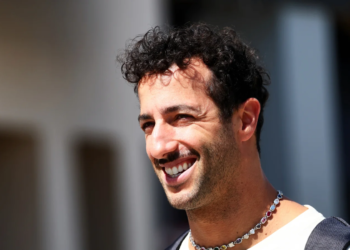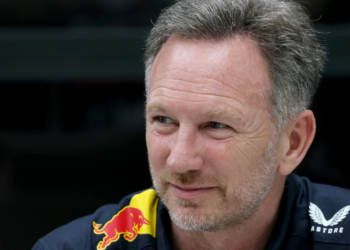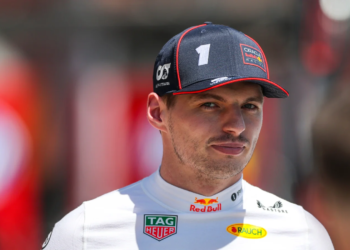Martin Brundle has criticised Formula 1’s engine grid penalty system, after a number of drivers took grid drops at recent races.
Last time out at Monza, eight drivers were demoted on the grid for taking on power unit elements outside of the FIA’s quota.
A similar situation existed at the Belgian Grand Prix last month, where once again, eight drivers were issued grid drops.
Brundle has hit out at the effect the system has for qualifying, as the final starting grid at Monza was not confirmed until hours after the session had ended.
“This is an unacceptable situation because when the fans turn up trackside or switch on their TV sets to watch qualifying, they should reasonably expect that they’re watching the race grid being formed,” he wrote in his column for Sky F1.
“Instead we waited for several hours for the tortuous and complex process of how penalties were applied.”
Brundle has suggested a number of alternative penalties, which could include in-race punishments or disciplining the teams financially.
“We need solutions here because this is a bad look for F1,” he said. “The initial concept is necessary to stop teams throwing new power units and ancillaries at their cars.
“Options might include simply giving each driver more power units per season, applying an in-race penalty such as a pitlane drive through to be taken at some point in the race, or giving the teams commensurate financial and championship points pain rather than the drivers having to carry the burden through no fault of their own.”
And while Brundle admits that watching faster cars come through the field can create a fascinating race, he asserts that having cars that have the potential to win at the front of the field will make for a stronger show.
“A mixed up grid can make for an interesting race observing drivers making their way through the field, but better still is when the six cars with a realistic chance of winning the race are wheel to wheel in the correct grid places.
“With 24 races next season and either three or six Sprint races, F1 clearly needs to get the regulatory allocation of power units and sporting regulations sorted out.
“In the multi-billion dollar world of F1 it looks ridiculous that the teams appear to be short of engines, which of course they’re not.”










Isn’t the rule for next season only 2 penalty free engines? Lol this is ridiculous…How do they expect 24 races, plus qualifying and sprint races, to be completed on 2 engines? This is F1, not your grandma’s Sunday drive to the grocery store.
“…The initial concept is necessary to stop teams throwing new power units and ancillaries at their cars. Options might include simply giving each driver more power units per season…”
Well, Brundle didn’t waste much time in getting on and contradicting himself there. If the penalties didn’t hurt, there’d be no point whatsoever in having any restrictions at all. Allowing more engines simply means the big teams get to throw more engines at the cars, precisely what he says needs to be stopped. And the idea of letting them wait until they pull way out in front of the rest of the field then do a drive-through is utterly pathetic.
“…better still is when the six cars with a realistic chance of winning the race are wheel to wheel in the correct grid places…”
The correct grid places? This gives away his true feelings. He doesn’t really mean it when he says the penalties are necessary to stop teams throwing engines at their cars. Surely, the correct grid places are wherever they end up after the application of all the pertinent rules of qualifying. Might as well do away with qualifying and just put the three leading teams at the front of the grid. While we’re at it, is there any particular team you’d like to be locking out the front row, Martin? Or any specific driver you want to see commence every race on pole position? Why not skip the racing and just award the points to whomever you want to receive them? Yeah, let’s go ahead and put Brundle’s ideas into action. Always supposing we wish to kill the sport, that is.